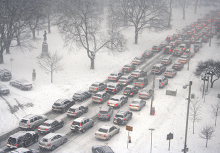Cleaning out is just half the work…
Datum: 2012-10-10 12:00

One of the most common things participants from my courses decide to do by the end of our day together is to clean out their desk the next day when they are back in their office.
And this is of course a good decision to make.
But, when I hear this, I can also hear warning-bells chime.
Back to square one
I see the ambition to clean out the desk as a sign of the longing to have fewer distractions in our daily lives, more space and time to work on what feels right to do right now, and simply for a lighter burden to bear.
When we only decide on cleaning our desk, there is a significant risk that we after a while have a cluttered desk again. If we only rid ourselves of what is on the desk without solving the root of the problem, it is only a matter of time before we are back to square one.
Being satisfied with just cleaning your desk is as if the politician responsible for traffic would let his breath out as soon as the traffic jams ease up around noon every day, and think “Great, now that problem’s solved!”.
… and refining your storage-space is the other half
But, “I am going to clear my desk” in combination with “and at the same time, I will change or make improvements on how I store what I want to keep”, is the golden key to success.
Do this
- If you want to have fewer things cluttering your desk, take out your calendar and schedule an hour when you will clear your desk properly (sure, you might not be able to do so in an hour, but it’s a step in the right direction).
- When it is time to clear your space, start processing whatever is on the desk.
- When you are going through the piles you wish to get rid of, think about why the items are on your desk rather than neatly filed away in binders or hanging file folders or scanned into digital form. There is always a reason why not. And it is not that you are “a bad person” in any way. It might for instance be due to one of the following three reasons:
- You have left it out on the desk so that you will not forget to so something that involves the material in question.
Perhaps you need to find a way to keep track of what you need to do that doesn’t require any desk-space, such as a to-do-list in Outlook or in an app on your phone. In the to-do-task that you create instead of leaving the material or item on your desk, refer to where you have put the material so that you will not have to look for it when you want to do the task. - You intended on filing it away, but ended up putting it in a pile just for now.
Your present storage space or system for papers and other materials is probably too cumbersome or complicated. Could you scan the material instead so that you have it easily accessible and out of sight, only in a digital format? Could you get rid of the binders and instead store things in hanging file folders which will provide you with a better overview, are easier to file material into, go through and clear out, and where you can store many different types of material? Could you move your bookshelf closer to your chair so that you only have to spin it 90 degrees to access your shelves? - You left the papers on your desk in fear of losing them if you filed them away amongst all your other material.
I am guessing that you have several places you store this particular kind of document or material in and you thereby risk having to look in more places than one when you need it again. Make an active decision on which of all the places you will store this type of material in from now on, and gather all the scattered materials in that one location. Make sure to always have an empty binder at hand (if binders are your chosen storage-tool) or an empty hanging file folder (if this is your preference), so that you can file away any new papers or materials with ease and without having to wait for the next time you are passing by the supply-storage space.
- You have left it out on the desk so that you will not forget to so something that involves the material in question.
- Decide to make one improvement and do so after considering the reason piles tend to form.
Define the first step you will take as a to-do-task you can do in one go and decide when you will do it.
When you have completed the task, you have taken a concrete step towards a life with fewer distractions where you do not have to spend so much time clearing your workspace. When you feel like it, repeat the steps listed above and take another step. And another.
What is your way to less clutter?
How do you keep your desk free of papers so that you avoid getting distracted while working? Add a comment to let us know.




